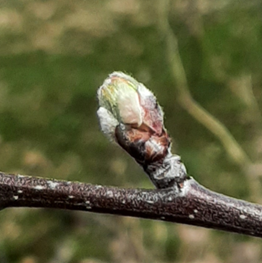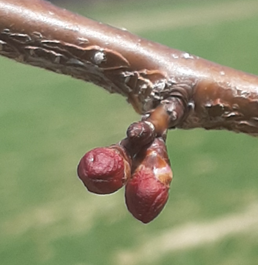Tree Fruit Newsletter — April 17, 2024
Highmoor Farm Bud Stages
McIntosh apple trees are at green tip as of April 15. Pears and stone fruits are also past the initial bud swell stage and are showing yellow and green tissue. The level of hardiness in our flower buds is not precisely known since it can vary from year to year and with variety. Nevertheless, the table below indicates level of hardiness according to bud stage.
| Early Pink | Late Pink | King Bloom | Full Bloom | |
| Lower limit | 21.7 | 22.5 | 23.7 | 24.4 |
| Upper Limit | 25.0 | 25.9 | 26.6 | 27.7 |
| From Szalay et al., 2019, based on six years of research in several varieties grown in Hungary. The lethal temperature varied from year to year and among ten varieties. | ||||
NEWA has stations in Maine with forecasting models for the level of flower bud hardiness in three apple varieties. For Augusta, ME, the tool indicates a hardiness of -25 °F, which is not accurate for green tip, so something’s not working with this model. Home | NEWA (cornell.edu) and Climate Smart Farming CSF Apple Stage & Freeze Damage Probability Tool
Apple Scab
McIntosh green tip marks the start of apple scab season. The link to the New England Tree Fruit Guide spray table for green tip. 2 – Green Tip (apple) | New England Tree Fruit Management Guide (netreefruit.org).
- Green tip in apple.
- Red bud in apricot.
Peach Leaf Curl
Peach leaf curl infections have already occurred and may be more severe than usual in orchards that went unsprayed last year. Infections occur when it rains during bud swell and will show up later this spring during the rapid shoot growth phase. Fruit infections are rare. This disease is not normally a problem in sprayed orchards, but many of us probably eliminated some fungicide sprays last year.
Rates of Nitrogen According to Soil Type and Tree Size
An important source of nitrogen comes from stored amino acids within the tree that was cycled back from the leaves last fall. Trees rely on these stored reserves during the first growth phase when soils are cold. Because last year was consistently wet, I suspect trees have been able to store away more nitrogen than during the previous dry years. As soils warm in spring, nitrogen supply comes from mineralization and from organic matter. Soils that contain 1% organic matter can supply 20 – 40 lbs. of nitrogen per acre per year, and more than this amount with higher levels of organic matter. These two factors can be taken into consideration when planning how much nitrogen fertilizer to use in your orchards this season. A third factor is tree size. Large semi-dwarf trees with a large canopy of shoots will use more nitrogen than small, dwarf trees. Small trees may not need additional nitrogen fertilizer when planted in reasonably fertile soil. The table below lists estimated need for elemental nitrogen based on these factors. Actual fertilizer rates will depend on the type of nitrogen fertilizer that you select.
| Mature tree size | |||
| Soil N supply in lbs. per acre | dwarf | small semidwarf | large semidwarf |
| 30 | 27 | 30 | 35 |
| 50 | 16 | 20 | 24 |
| 65 | 8 | 10 | 16 |
| 80 | 0 | 3 | 7 |
| Warren Stiles, 1994 | |||
Renae Moran
UMaine Cooperative Extension Tree Fruits Program
Highmoor Farm
PO Box 179
Monmouth, ME 04259
(207) 933-2100
rmoran@maine.edu
In complying with the letter and spirit of applicable laws and pursuing its own goals of diversity, the University of Maine System does not discriminate on the grounds of race, color, religion, sex, sexual orientation, transgender status, gender, gender identity or expression, ethnicity, national origin, citizenship status, familial status, ancestry, age, disability physical or mental, genetic information, or veterans or military status in employment, education, and all other programs and activities. The University provides reasonable accommodations to qualified individuals with disabilities upon request. The following person has been designated to handle inquiries regarding non-discrimination policies: Director of Equal Opportunity, 5713 Chadbourne Hall, Room 412, University of Maine, Orono, ME 04469-5713, 207.581.1226, TTY 711 (Maine Relay System).


